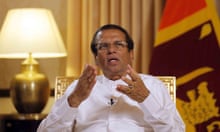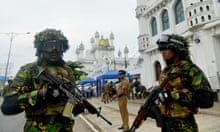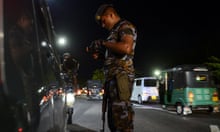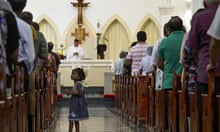Three days after the bombings of churches and luxury hotels that killed over 300 people in Sri Lanka, Islamic State has claimed responsibility for the atrocity.
The claim was not unexpected. The bombings – multiple suicide attacks designed to cause mass casualties among Christian worshippers on Easter Sunday and among tourists too – had all the hallmarks of an Isis attack. The group needs to prove its capability and relevance after suffering defeat in its core heartland in Syria and Iraq. It still commands support among a network of sympathisers across the Islamic world. It had the motives and the means.
Also, the local suspects named repeatedly by Sri Lankan officials do not seem convincing candidates as the sole perpetrators. They belong to a small, disorganised group, National Towheed Jamaat (NTJ), which has no history of lethal violence. Investigations are now showing that several of its members were among the suicide bombers. Its leader, a village cleric with a reputation for extremist rhetoric, may have been too.
But extremists like these would have needed significant assistance to put together such a complex operation. The bombs on Sunday needed thorough reconnaissance of targets, bomb-making skills, safe houses, explosives, vehicles and coordination. Most Islamic extremist attackers in recent years have sought the support of senior militant leaders and often the religious sanction of senior clerics too.
All this pointed to international involvement and by Monday night, western and south Asian security officials were working on a scenario involving a weak but motivated local group “upgraded” by a major, experienced organisation through the provision of logistical assistance, tactical advice and possibly training. The major organisation then deployed this newly capable outfit on a project that would fit its own strategic ends.
This “sub-contracting plus” model, as one official called it, has been seen before in south Asia and elsewhere. A bloody 2016 attack in Bangladesh on a bakery patronised by westerners is one example. A double bombing of Christian worshippers in the Philippines in January is another.
Al-Qaida was once known for such operations but has in recent years tried to avoid indiscriminate mass murder. This is a pragmatic decision, taken solely because its leadership became aware such atrocities put off potential supporters and they hope to distance the group from the even more extreme Isis. It means nonetheless that it was always unlikely that the organisation that once killed 3,000 in a single operation in the US in 2001 was responsible for this latest atrocity.
Security officials and analysts say they are treating the Isis claim as credible.
Several dozen Sri Lankans travelled to join Isis in Syria, with one dying as early as 2015. There have also been a very significant number of Isis volunteers recruited from the Maldives, which just a short flight away from Sri Lanka, and a far smaller number from southern India. The alleged leader of the NTJ reportedly fled to the Maldives, which has become a hub of Islamist activism in recent years, to escape the security forces’ attention in Sri Lanka.
The possibility is high that someone from among this shadow world of travelling extremists, all connected through encrypted social media channels and some with battlefield experience, could be the “connector” that linked the amateurish Sri Lankans with those overseas who could give them the capability and confidence to commit mass murder. That Syrian returnees are also among the attackers is also very likely.
After any terrorist attack anywhere in the world, there is confusion, contradictory information and efforts by many actors to avoid blame.
It seems unlikely that the bombings on Sunday were carried out in response to the terrorist attack by a white supremacist gunman in Christchurch, New Zealand in March, for example.
At first glance, this claim, made by Ruwan Wijewardene, the Sri Lankan defence minister, appears plausible. Like all terrorism, Islamic militant attacks are often framed as reactions to the acts of aggression by others, and justified by the imminent danger faced by their community. Single events provoke what is seen by their perpetrators as retaliation.
But though it is possible that the New Zealand mosque killings accelerated the Sri Lankan attacks, it would be very hard for even a capable and experienced terrorist group with an extensive infrastructure to put together such a complex operation from scratch in just five weeks. So far, it appears the claim was based solely on an intelligence memo noting that one member of the NTJ updated his social media accounts “with extremist content” in the aftermath of the Christchurch attack.
On Tuesday morning Wijewardene also told parliament that the death toll had climbed to 321 people, and reiterated that the prime minister and other key officials were never told about the possibility of an impending attack. Sri Lanka’s politics are a bitter zero-sum battle for influence and power. The government is deeply divided and the security establishment is highly politicised. All actors seek to avoid blame, and for many the priority is to direct attention away from what were clearly major failings of both security process and policy. This is a poor environment for a difficult and delicate investigation at a time of deep grief and national trauma.









